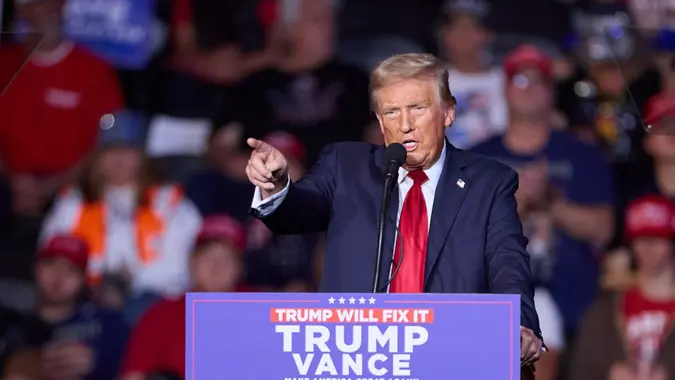I’m an Economist: 3 Trump Economic Policies That I Believe Would Hurt the Economy

Commitment to Our Readers
GOBankingRates' editorial team is committed to bringing you unbiased reviews and information. We use data-driven methodologies to evaluate financial products and services - our reviews and ratings are not influenced by advertisers. You can read more about our editorial guidelines and our products and services review methodology.

20 Years
Helping You Live Richer

Reviewed
by Experts

Trusted by
Millions of Readers
As economists analyze the candidates’ economic proposals for 2024, some of former President Donald Trump’s policies are raising serious concerns among experts. While all presidential candidates propose policies that could impact the economy — and, ultimately, your finances — here’s what two economists identify as potentially damaging in Trump’s economic agenda.
The Tariff Tsunami
Kislaya Prasad, research professor at the University of Maryland’s Robert H. Smith School of Business, is concerned about Trump’s dramatic tariff proposals: a tariff of up to 20% on imports into the U.S., with a tariff of 60% on goods imported from China.
For context, “the tariff on goods from most countries is currently negligible, and on Chinese goods, it is around 10% on average,” Prasad said.
The Consumer Cost Burden
Who really pays for these tariffs? According to Prasad, it’s likely to be American consumers.
“Studies suggest that the last round of China tariffs were mostly passed on to consumers,” he explained. “While some U.S. producers and workers may benefit, costs are largely borne by U.S. consumers.” He pointed to electric vehicles as an example where American consumers end up paying more.
The Tax Revenue Problem
Jonathan Ernest, Ph.D., assistant professor of economics at Case Western Reserve University, sees serious issues with Trump’s tax proposals.
“A removal of income tax revenue is unlikely to generate enough extra economic activity to decrease the deficit and start to pay down the nation’s ballooning national debt,” he explained.
More concerning, Ernest said, “Attempting to replace this revenue with tariffs would essentially replace a progressive tax with a regressive one, leading to higher prices for low-income and middle-class American consumers at a time when inflation is finally getting under control.”
The Global Trade Ripple Effect
Prasad emphasized that Trump’s trade policies could have unintended consequences.
“If we sever trade ties with the rest of the world, other countries will rely more on each other,” he explained. “This will have unintended strategic consequences for the United States.”
He pointed to what happened with previous tariffs: “The net effect of greater tariffs on Chinese imports was that we imported less from China — as intended — but imported more from other countries.”
The Final Word
While both experts acknowledge that both candidates’ policies have potential drawbacks, they see particular risks in Trump’s approach.
As Ernest put it, “Many economists have argued that Harris’ policies will be far less detrimental to the U.S. economy.”
Prasad agreed. “If Mr. Trump’s new tariff proposals were implemented, they would probably do more damage [than Harris’ plans].”
Editor’s note on election coverage: GOBankingRates is nonpartisan and strives to cover all aspects of the economy objectively and present balanced reports on politically focused finance stories. For more coverage on this topic, please check out I’m an Economist: 3 Harris Economic Policies That I Believe Will Hurt the Economy.
 Written by
Written by  Edited by
Edited by 

























